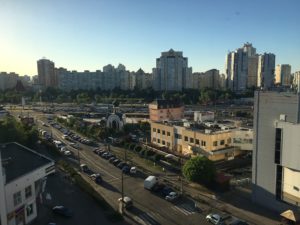My SLA experience in Ukraine emphasized the importance of cultural immersion in learning a new language, particularly when that language is rarely spoken natively in the US. While I am not primarily an auditory learner, hearing Russian both in the classroom and on the street most definitely improved my listening comprehension. When listening to a conversation about a familiar topic, I can now understand at least 75% of what is being said, and if I’m watching a movie or TV show that includes some Russian, I can usually understand 90% of it without looking at the subtitles (the Russian in English-speaking films or shows is slower and typically does not have a native accent). I would say that in terms of pronunciation and listening comprehension, I met my language learning goal, but also look forward to improving both during the upcoming year. I think that in terms of my goal to comfortably carry on a conversation about daily topics, I fell short with regard to the term “comfortably” on quite a few occasions, but saw some improvement when I stopped focusing so much on the grammar and instead focused on trying to communicate my thoughts. In terms of my last goal, to write in Russian about my experience in Ukraine, I would say that I also accomplished this goal, because although I have yet to actually write about my experience in Russian, I wrote a final essay for my class describing why I want to study film. I was able to use the vocabulary and discussions about politics we had learned in class to write my essay, and was able to speak about a topic more complex than writing about basic categories, such as what activities I did over the weekend or the weather.
I also gained new insights about the value of traveling. At least for me, living in the US makes the rest of the world seem thousands of miles away (which is it), and consequently the events and people don’t seem as immediate as what’s happening in this country. However, while I was in Ukraine, I was struck by how both Ukrainians and other Europeans I met were so aware of what is going on in the US and in many other European and non-European countries in the world. While I have been interested in international relations for a long time, I didn’t really understand how much geography impacted domestic and international politics until I went to Ukraine. I feel like I now have a better understanding of how geographically isolated the US is, and how this may contribute to the general American public’s lack of awareness and apathy towards international affairs. This has also made me more interested and invested in Eastern Europe, not only because I have never specifically studied Eastern Europe before, but also because communicating with people who live there has made me want to know more about their lives and their reality. For someone who is considering applying for an SLA grant, I would say two things: 1) it will be both an invaluable language experience and opportunity to make real connections with people who speak the language; and 2) go to your country of study as long as you possibly can. The longer you are immersed in the language and the culture, the more natural it feels and, at least for me, the more comfortable you will be to communicate with people and make real progress.
As I look forward to beginning my senior year in college, my SLA experience has given me reason to reconsider my post-graduate plans. While I am still considering many possibilities after graduation, spending time in Ukraine has made me want to achieve fluency in Russian and has renewed my interested in political science (my second major). I think that my improved listening comprehension skills will be beneficial in my last year of Russian classes, and I am looking for ways to continue learning the language post graduation, whether it is graduate school or a career. However, language-specifics aside, my SLA experience has given me more confidence in speaking with other people in general, either in Russian or English. As I mentioned in a previous blog post, I tend to be introverted, and while I have worked to be more outgoing during my time in college, it was a new challenge to try to be outgoing in a different language. But this challenge also helped me work on my social and conversational skills in a different way that will stay with me as I move forward in my academic and professional career.





















